Category: Parliament and State Legislatures – structure, functioning – GS2D
India’s abstention on UNSC vote over Russia’s invasion of Ukraine
03, Mar 2022
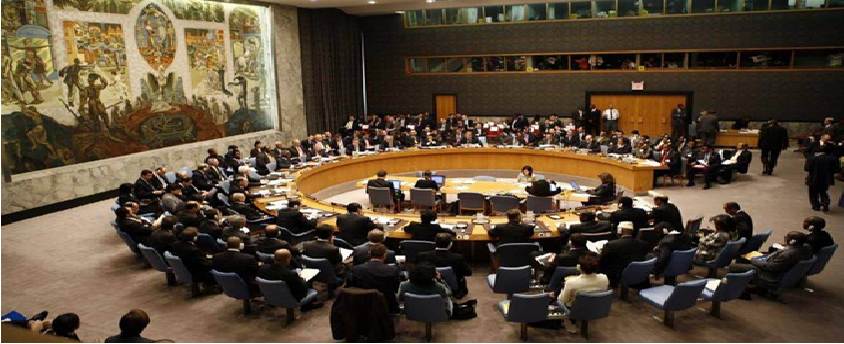
Why in News?
- India recently abstained on a US-sponsored UN Security Council resolution that “deplores in the strongest terms” Russia’s “aggression” against Ukraine.
Who moved the Resolution?
- The UN Security Council voted on the draft resolution presented by the US and Albania, and co-sponsored by several other nations, including Australia, Estonia, Finland, Georgia, Germany, Italy, Liechtenstein, Lithuania, Luxembourg, New Zealand, Norway, Poland, Romania and the United Kingdom.
What was the Resolution About?
- The Council’s resolution reaffirmed its commitment to the sovereignty, independence, unity and territorial integrity of Ukraine within its internationally recognised borders.
- The resolution “deplores in the strongest terms Russia’s aggression against Ukraine” and decides that Russia “shall immediately cease its use of force against Ukraine and shall refrain from any further unlawful threat or use of force against any UN member state”.
- The resolution added that Russia “shall immediately, completely, and unconditionally withdraw all of its military forces from the territory of Ukraine within its internationally recognised borders”. It also asked Moscow to “immediately and unconditionally reverse the decision related to the status of certain areas of Donetsk and Luhansk regions of Ukraine”.
- In UN Security Council meeting on #Ukraine today, India abstained on the vote on draft resolution.
Why did India Abstain?
- India did not endorse the harsh language used in the resolution condemning Russia’s actions.
- It wants to maintain a balance between the Western bloc led by the US, and Russia, since it has strategic partners on both sides.
- India’s past record has been maintaining balance between the West and Russia. On January 31, India abstained on a procedural vote on whether to discuss the issue of Ukraine. New Delhi had then articulated its position on “legitimate security interests” that echoed with a nuanced tilt towards the Russian position, and had abstained along with Kenya and Gabon.
So, what was the Fate of this Resolution?
- While Russia — which chaired the meeting of the UNSC since it holds the presidency for the month of February — vetoed the resolution, China, too, abstained along with the United Arab Emirates.
- Despite the remaining 11 members of UNSC, including US, UK, France, voting in favour of the resolution, it did not pass since Russia vetoed it.
- China’s abstention is a surprise since it had opposed the vote on January 31, and was seen echoing Russia’s position.
How did India Explain its vote?
- First, it said that it is “deeply disturbed”, but did not name Russia at all. India is deeply disturbed by the recent turn of developments in Ukraine.
- Second, it reiterated its appeal for “cessation of violence”. India urge that all efforts are made for the immediate cessation of violence and hostilities. This was conveyed by Prime Minister Narendra Modi to Russian President Vladimir Putin as well during the phone call.
- Third, it flagged its core concern about Indian nationals in Ukraine — about 16,000 are still stuck, most of whom are students. “India is also deeply concerned about the welfare and security of the Indian community, including a large number of Indian students, in Ukraine.
- Fourth, it touched upon “territorial integrity and sovereignty”, which was a new theme. The contemporary global order has been built on the UN Charter, international law, and respect for the sovereignty and territorial integrity of states. All member states need to honour these principles in finding a constructive way forward.
- Fifth, it advocated diplomacy. Dialogue is the only answer to settling differences and disputes, however daunting that may appear at this moment. It is a matter of regret that the path of diplomacy was given up. We must return to it. For all these reasons, India has chosen to abstain on this Resolution.
Was India under Diplomatic Pressure?
- Before the United Nations Security Council took up the draft resolution condemning the Russian invasion, India was caught in a diplomatic bind between the Western powers and Russia.
- Ambassadors of European countries in India got together in New Delhi and expressed solidarity with their Ukrainian counterpart and strongly condemned Russia’s “unprovoked and unjustified” military attack on Ukraine.
- British and EU Foreign ministers had also called up Jaishankar, while ambassadors of G-7 countries had expressed support for the Ukrainian ambassador.
So, is this good for India’s Diplomatic Space?
- Experts said that India maintained its “consistent, steadfast and balanced position on the matter”.
- “India has been in touch with all sides, urging the parties concerned to return to the negotiating table. By abstaining, India retained the option of reaching out to relevant sides in an effort to bridge the gap and find a middle ground with an aim to foster dialogue and Diplomacy,” a source said.
- An earlier draft of the resolution had proposed moving the resolution under Chapter VII of the UN Charter, which provides the framework within which the Security Council may take enforcement action, the sources added. However, this was dropped in the final version that was put to vote.
WHAT IS A WHIP? WHAT DOES IT DO?
20, Jul 2019
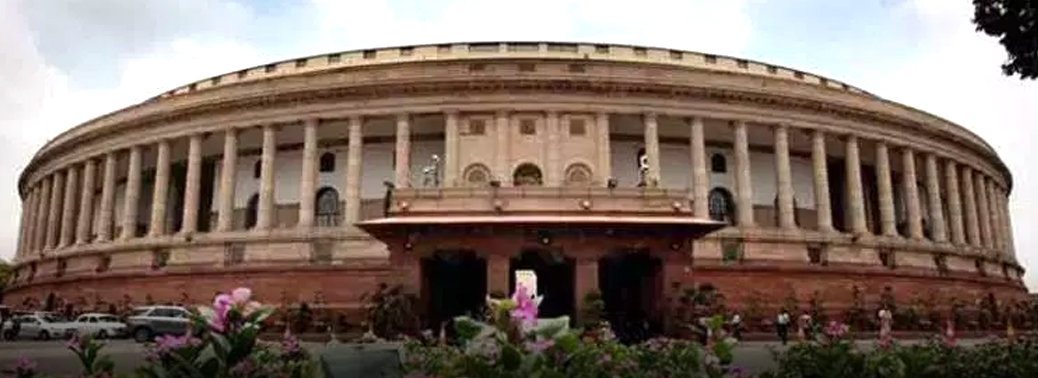
What is a WHIP?
- A whip in parliamentary parlance is a written order that party members be present for an important vote, or that they vote only in a particular way.
- The term is derived from the old British practice of “whipping in” lawmakers to follow the party line.
- In India all parties can issue a whip to their members.
- Parties appoint a senior member from among their House contingents to issue whips — this member is called a Chief Whip, and he/she is assisted by additional Whips.
Kinds of WHIPS:
- The importance of a whip can be inferred from the number of times an order is underlined.
- A one-line whip, underlined once, is usually issued to inform party members of a vote, and allows them to abstain in case they decide not to follow the party line.
- A two-line whip directs them to be present during the vote.
- A three-line whip is the strongest, employed on important occasions such as the second reading of a Bill or a no-confidence motion, and places an obligation on members to toe the party line.
Defiance of WHIP:
- The penalty for defying a whip varies from country to country.
- In the UK, MPs can lose membership of the party, but can keep their House seats as Independents.
- In India, rebelling against a three-line whip can put a lawmaker’s membership of the House at risk. The anti-defection law allows the Speaker/Chairperson to disqualify such a member
- The only exception is when more than a third of legislators vote against a directive, effectively splitting the party.
ANTI-DEFECTION LAW
13, Jul 2019
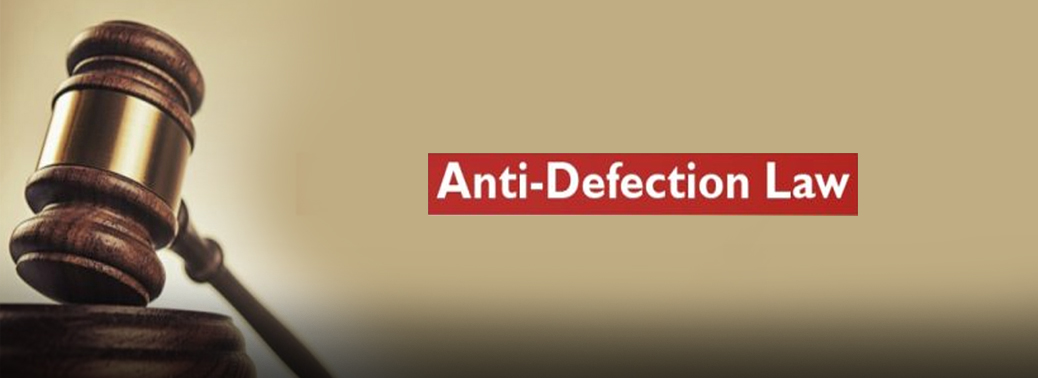
- Context: In the light of the Karnataka Assembly crisis, the Anti-Defection Law is being debated nationally.
About Anti-Defection Law:
- Anti-Defection law is contained in the Tenth Schedule of the Constitution, which was introduced by the 52nd Amendment in 1985 During tenure of Rajiv Gandhi.
- Definition of Defection: Defection is defined as” to abandon a position or association, often to join an opposing group” which essentially describes a situation when a member of a particular party abandons his loyalty towards that party and provide his support (in the form of his vote or otherwise) to another party.
When was the Anti-Defection Law instituted and what was the Trigger?
- For a long time, the Indian political scene was besmirched by political defections by members of the legislature. This situation brought about greater instability in the political system.
- The infamous “Aaya Ram, Gaya Ram” slogan was coined against the background of continuous defections by the legislators. Legislators used to change parties frequently, bringing about chaos in the legislatures as governments fell. In sum, they often brought about political instability.
- This caused serious concerns to the right-thinking political leaders of the country.
- Several efforts were made to make some law to curb defections. Starting from private members’ efforts, Bills were brought in by the government at different times.
- No Bill could be passed because of one reason or the other. However, the most important reason was that there was no consensus on the basic provisions of an anti-defection law.
- Members of Parliament were concerned about the freedom of speech in Parliament and other legislatures as they had a fear that too stringent a law on defection would likely curb the freedom of speech (which is a constitutional right) of the legislators. A lot of time was taken before a consensus could be reached on this issue.
- Finally, in 1985, the Rajiv Gandhi government brought a Bill to amend the Constitution and curb defection.
- The 10th Schedule of the Constitution, which contains the anti-defection law, was added to the Constitution through this amendment.
What is the purpose of the anti-defection law? What are the grounds of disqualification?
- The purpose of the law is to curb political defection by the legislators.
- There are two grounds on which a member of a legislature can be disqualified:
-
- If the member voluntarily gives up the membership of the party, he shall be disqualified. Voluntarily giving up the membership is not the same as resigning from a party. Even without resigning, a legislator can be disqualified if by his conduct the Speaker/Chairman of the concerned House draws a reasonable inference that the member has voluntarily given up the membership of his party.
- If a legislator votes in the House against the direction of his party and his action is not condoned by his party, he can be disqualified. These are the two grounds on which a legislator can be disqualified from being a member of the House.
- However, there is an exception that was provided in the law to protect the legislators from disqualification. The 10th Schedule says that if there is a merger between two political parties and two-thirds of the members of a legislature party agree to the merger, they will not be disqualified.
Exceptions:
- If a Person is elected as speaker or chairman then he could resign from his party, and rejoin the party if he demitted that post. No Disqualification in this case.
- A Party could be merged into another if at least one – thirds of its party legislators voted for the merger. The Law initially permitted splitting of parties, but that has now been made two – third. As Soon as this law was passed, it was met with severe oppositions on logic that it impinged on right to free speech of legislators. A PIL was filed in the supreme court in the form of famous Kihoto Hollohon vs Zochillhu and others (1992). This PIL had challenged the constitutional validity of the law.
- But SC upheld the constitutional validity of 10th Schedule. Court also decided that the law does not violate any rights of free speech or basic structure of the parliamentary democracy.
- However, Supreme Court also made some observations on section 2(1) (b) of the Tenth Schedule, Section 2(1) (b) reads that a member shall be disqualified if he votes or abstains from voting contrary to any direction issued by the Political party.
- The Judgement highlighted the need to limit disqualifications to votes crucial to the existence of the government and to matters integral to the electoral programme of the party, so as not to ‘unduly impinge’ on the freedom of speech of members.
91st Amendment Act, 2003
- When it was enacted first, there was a provision under which if there occurs a split in the original political party and as a result of which one-third of the legislators of that party forms a separate group, they shall not be disqualified.
- This provision resulted in large scale defections and the lawmakers were convinced that the provision of a split in the party was being misused.
- Therefore, they decided to delete this provision.
- Now at least two-thirds of the members of a party have to be in favor of a “merger” for it to have validity in the eyes of the law.
- The 91st Amendment also makes it mandatory for all those switching political sides – whether singly or in groups – to resign their legislative membership. They now have to seek re-election if they defect.
Is the law, as it stands now, open to interpretation?
- The first ground for disqualifying a legislator for defecting from a party is his voluntarily giving up the membership of his party. This term “voluntarily giving up the membership of his party” is susceptible to interpretation.
- As has been explained earlier, voluntarily giving up the membership is not the same as resigning from a party.
- Then what exactly it means? How can one decide that a member of a legislature has voluntarily given up the membership of his party? The Supreme Court has clarified this point by saying that the presiding officer, who acts as a tribunal, has to draw a reasonable inference from the conduct of the legislator.
How far has the law succeeded in achieving its goal?
- The law certainly has been able to curb the evil of defection to a great extent. But, of late, a very alarming trend of legislators defecting in groups to another party in search of greener pastures is visible.
- The recent examples of defection in state Assemblies and even in Rajya Sabha bear this out. This only shows that the law needs a relook in order to plug the loopholes if any. But it must be said that this law has served the interest of the society.
- Political instability caused by frequent and unholy change of allegiance on the part of the legislators of our country has been contained to a very great extent. That is a story of success of one of the most important legislation that the Indian Parliament has enacted
Bill Passed for 16% Maratha Quota in PG Course
23, Jun 2019

- The Maharashtra Legislative Council cleared a bill to provide 16% reservation to the Maratha
- community students in post-graduate (PG) medical courses.
- This comes a day after the bill was unanimously passed in the Legislative Assembly.
- As both the Houses of the Legislature have cleared the bill, it will now be sent to the Governor for his approval.
Speaker
19, Jun 2019
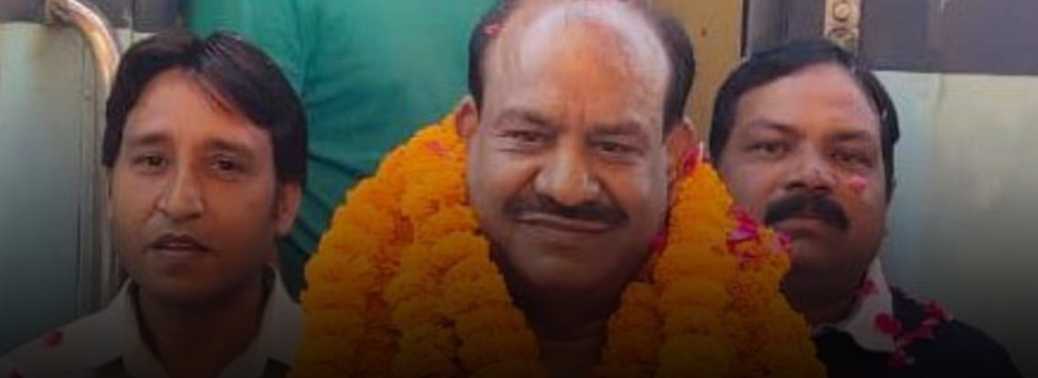
Context:
- MP Om Birla named as choice for Speaker’s post.
- He is presiding officer of Lok sabha.
- He is the guardian of powers and privileges of members and committees of Lok Sabha
Duration in Office:
- Speaker remains in office during the life of Lok Sabha (he needs to remain member of Lok Sabha).
- When the office of Lok Sabha speaker falls vacant, the members elect another speaker on a date fixed by the President.
- Whenever Lok Sabha is dissolved, the Speaker continues to remain in office until immediately before the first meeting of Lok Sabha after it is reconstituted.
Resignation:
- Disqualified if ceases to be the member of House Addressing a resignation letter to Deputy Speaker
Removal:
- Speaker can be removed by the members of Lok Sabha by a resolution passed by Absolute Majority {Majority of the Total Members of the House} of Lok Sabha.
- 14 days advanced notice must be given for such resolution.
- The Motion of Removal can be considered and discussed only when it has the support of at least 50 Members.
- If resolution is under consideration of the house, Speaker Cannot Preside the Meeting, but can participate in the house and vote in the first instance though not in the case of an equality of votes.
Powers and Functions:
- The Guardian of powers and privileges of members and committees of Lok Sabha. To Maintain order and decorum in Lok Sabha
- His interpretations of constitutional provisions, rules and regulations related to Lok Sabha are final.
- Adjournment of Lok Sabha is done by Speaker
- During voting in the house on a bill or other matters, he does not vote in the first instance. However, if there is a tie due to equal votes, speaker exercises the casting vote
- Joint sittings of both the houses of parliament are although called by President but presided by Lok Sabha speaker.
- On the request of the Leader of the House, Speaker may allow a secret meeting.
- Whether a bill is money bill or not, is decided by Speaker and his decision in this matter is final.
- Disqualification of Members of House-
- Speaker decides the question of disqualification of Lok Sabha members in matters of tenth schedule / anti-defection law. This decision is subject to judicial
- He is the Ex-Officio Chairman of Indian Parliamentary Group of the Inter- parliamentary Union.
- Chairman of all the parliamentary committees of Lok Sabha are appointed by Speaker, provided such committees does not need an elected chairman
- Speaker himself is the chairman of
- Business Advisory Committee,
- Rules Committee and
- General Purpose
- The Secretary General of the Lok Sabha is appointed by the Speaker.
Deputy Speaker of Lok Sabha:
- If Speaker of Lok Sabha is not available, his duties are carried out by Deputy Speaker Election– A Deputy Speaker is elected by the Lok Sabha members from amongst themselves.
- Election of Deputy Speaker is done after election of Speaker.
- Deputy speaker is not subordinate to the Speaker and is directly responsible to Lok Sabha.
- If Deputy Speaker is also not present, a person appointed by President will discharge the duties.
Pro Tem Speaker:
- President appoints a speaker Pro Tem for the first meeting of the newly elected Lok Sabha. He is appointed to administer oath to the new members and enable the house to elect a new speaker (Before Oath they cannot be member of house and participate in proceeding).
BIMAL JALAN COMMITTEE ON THE QUANTUM OF RESERVES
17, Jun 2019
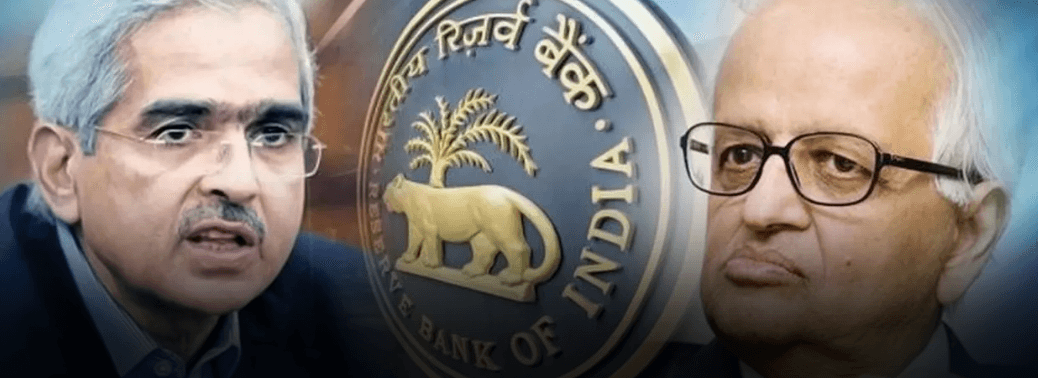
Constituted on 26 December 2018, to decide upon the appropriate level of reserves the regulator should hold. This committee has been appointed in the backdrop of a deadlock between the RBI and the Government. The government feels that RBI’s reserves exceeded its limits and that these could be used for productive purposes such as recapitalizing public sector banks.
What are RBI Reserves?
RBI holds reserves in currency and gold inorder to:
- Absorb potential losses that it may incur while holding foreign
- Shield the economy from monetary and financial
- Carry monetary burden during unstable
- Perform price and exchange
- Perform its functions independently of the government
- RBI holds 25.6 % of its assets as reserves while the global median is 16%. Under Section 47 of RBI Act, RBI transfers the excess funds to the Government after accounting for contingency reserves.
LEADER OF OPPOSITION
17, Jun 2019
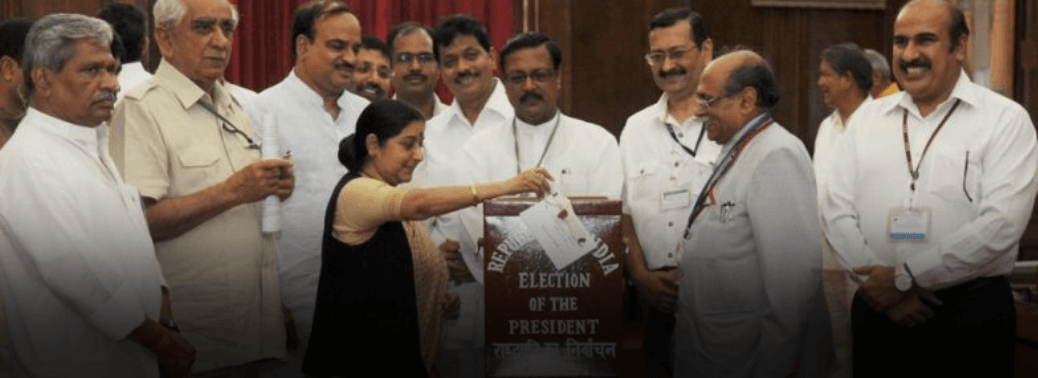
Context:
- Like 2014 leader of opposition no political party is qualifying that mark of 55 MPs in Lok Sabha to get Leader of opposition.
- UPSC Question Prelims – Leader of Opposition in 2018
About:
- Lop is leader of largest non-government party.
- Source of Lop- ‘the salary and allowances of leaders of opposition in Parliament Act, 1977’ which only says that the largest opposition party should get the post securing 10%(at least a strength equal to the quorum) of seats.
- This act for LoP is extended to both Lok Sabha and Rajya Sabha.
- The Leaders and Chief Whips of Recognised Parties and Groups in Parliament (Facilities) Act, 1998 also refers to a recognised party in the Lok Sabha as a party that has not less than 55 members.
Constitutional Provision:
- There is no provision in the Constitution or even in the Lok Sabha Rules of Procedure in regard to the recognition of the LoP.
- Since there is no constitutional provision, the 1977 law does not provide for the requirement of 55 members as an essential pre requisite. As it all depends on the Speaker’s directions and discretion.
Importance of LoP:
- To Democracy to survive there is need of effective and strong opposition.
- It is said that if no Opposition exists, one may have to be created. Also, if there is no Opposition outside, there is every danger that it may grow within.
History:
- First officially recognized LoP was after breakup of congress in 1969, The Leader of INC(O), Ram Subhag Singh, became the first LoP in Lok sabha.
Hint for Way Ahead:
The simple way out is to substitute ‘pre -poll alliance’ for ‘party’ or say ‘party or pre- poll alliance’. and get that number of 55 MPs.






